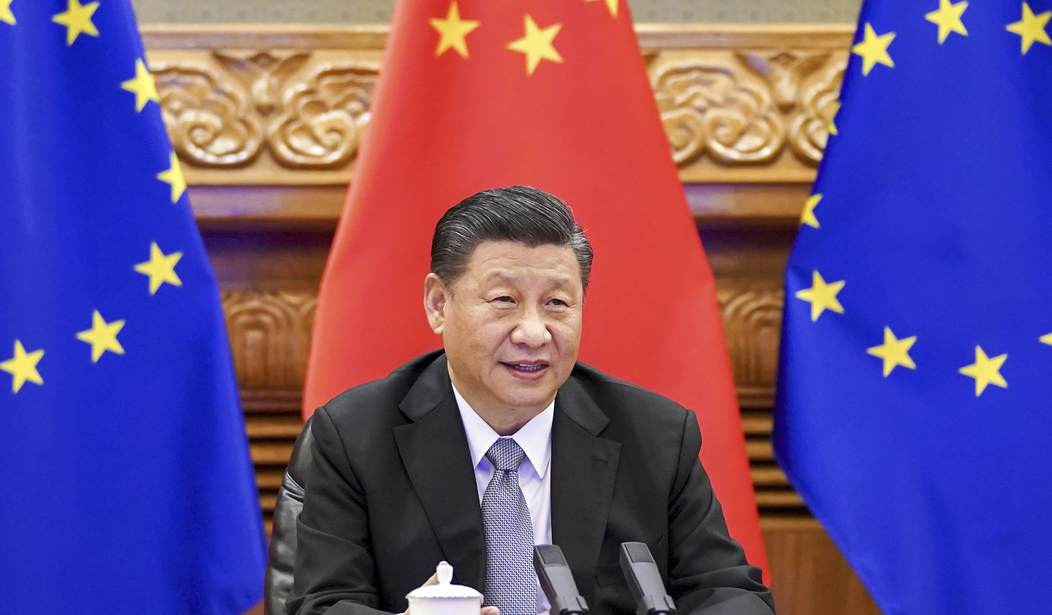On Thursday, Sen. Tom Cotton (R-Ark.) released a roadmap to counter the Chinese Communist Party and prevail in a new “Cold War” against this “Evil Empire.”
“This Evil Empire preys on—and spies on—Americans. It imprisons innocent people in concentration camps. It uses slave labor to fuel its factories. And it denies basic freedoms to all its 1.4 billion people,” Cotton declared in a speech at the Ronald Reagan Institute in Washington, D.C. “We need to beat this Evil Empire—and consign the Chinese Communists, like the Bolsheviks, to the ash heap of history.”
He released a report entitled “Beat China: Targeted Decoupling and the Economic Long War” that laid out three central goals to combat China: decoupling, mitigating the effects of decoupling, and reorganizing the federal government to better respond to the CCP.
Cotton praised Reagan’s historic success at defeating the Soviet Union without firing a shot, but he warned that the “Cold War” against China “will be more complicated than the first. China is wealthier and more populous than any enemy America has ever faced. It’s also more entangled with us economically.”
Cotton acknowledged that America’s “deep dependence on China didn’t grow overnight.” Rather, Americans actively pursued a “strategic partnership” with the Chinese Communist Party on the grounds that open markets and open borders would make China rich and then lead China on the path to freedom. China indeed became rich, “but instead of reforming, the Communist Party began to exploit new connections between our free society and its totalitarian society.”
As Cotton noted, the CCP made spies out of the Chinese students who came to American universities to study. Beijing forced companies to hand over proprietary technology in exchange for access to China’s market. China has also threatened to cut off essential goods, the production of which the U.S. outsourced to China. This week, the CCP proposed export controls on rare-earth minerals that are vital for various forms of American technology, including weapons systems.
The CCP’s nefarious malfeasance regarding the COVID-19 pandemic should also underscore the need to counter China. The CCP lied to cover up the pandemic early on, and waited until after 5 million people had left Wuhan before locking down the city. The party destroyed early samples of the virus, silenced doctors who tried to warn the world about it, pressured the WHO into lying about the pandemic, requested personal protective equipment (PPE) from across the world and then extorted foreign countries when they made the same request. The CCP even prevented U.S. companies from shipping their medical gear back home.
America has to fight back, and Cotton laid out three steps to do so.
China Is Committing Another Holocaust. Pompeo Draws a Line in the Sand
1. Decoupling
Cotton’s strategy hinges on the idea of decoupling, separating the U.S. from China on the economic and political fronts. “Any serious strategy to beat China must start with a commitment to decouple our countries in key areas, in order to exploit the leverage we have over China and minimize its leverage over us,” he explained. “As we pull apart, we’ll also have to rebuild parts of our economy to minimize the costs of separation.”
Cotton encouraged the Joe Biden administration to build on the Trump administration policy of sanctioning notorious actors in the CCP, especially human rights abusers, cutting them off from the U.S. financial system.
“We ought to expand this campaign to include entire Chinese companies that steal American intellectual property—or even benefit from stolen IP. The message should be clear: steal from Americans once, look over your shoulder forever,” Cotton urged.
He also called for Congress and the president to reverse China’s Permanent Normal Trade Relations status President Bill Clinton signed into law in 2000. Before that law, Congress and the president reviewed China’s trade privileges each year in light of the CCP’s progress on human rights.
Cotton urged the U.S. to tighten export controls “to prevent China from obtaining cutting-edge technology with military applications.”
He also called for the U.S. to “cut off the spigot of money that has fueled China’s rise and corrupted our elites, creating a China Lobby stretching from New York and Washington to Silicon Valley and Hollywood, touching corporate boardrooms and college campuses in between.” America should scrutinize inbound investment from China while preventing outbound investment into China. This would include “preventing American pension funds from investing in companies with close ties to the Communist Party or People’s Liberation Army.”
Cotton called on America to admit fewer Chinese nationals for work and study, and to admit none in advanced STEM fields at the graduate level and above.
Chilling Testimony Reveals U.S. Medical Supply Chain Vulnerable to China Amid Coronavirus
2. Rebuilding America
These “decoupling” policies would not just hurt China. They will also leave American investors fewer options, American universities fewer students, and American industries fewer manufactured goods, at least in the short run.
America must ramp up its own economy to meet the threat from China, Cotton insisted.
He acknowledged that cutting the number of Chinese students in STEM fields would “be a painful divorce for universities and Big Tech companies that rely on Chinese nationals to pay their bills and staff their labs.” Yet Cotton insisted that “with the right incentives and support, we can replace Chinese nationals with American students—and once the supply of bright young Americans has been exhausted, we can turn to our allies, instead of deepening the talent pool of our number-one enemy.”
The senator insisted that America must break its “dependence on China for basic goods that are critical to survival, such as essential medicines, medical supplies, and rare-earth elements. The United States foolishly sent much of this production overseas in the belief that it was ‘low value.’ Now we have to bring it back. A nation that cannot heal itself, care for its sick, and keep its aircraft in the sky is not secure—and will not remain a superpower for long.”
Cotton argued that America should pair export controls on cutting-edge technology “with investment in R&D and manufacturing so the future of these critical technologies is made in America, not in Asia—and certainly not in China.”
3. Restructuring the federal government
Cotton noted that the federal government has not faced “great-power competition” for three decades, “so decoupling must come with a reorganization of government.”
He argued that export-control authorities like the Bureau of Industry and Security should move from the Commerce Department to a national-security department like State. He called for the Department of Treasury’s Office of Foreign Assets Control to expand and establish a “separate task force devoted to sanctioning China’s IP thieves, military companies, and state-owned puppets.” Finally, he called for the secretary of defense to have a more prominent role at the Committee on Foreign Investment in the United States “to ensure the national-security perspective takes precedence in decisions regarding Chinese investment in our country.”
Green Activists Fuel China’s Dominance in a Sector Critical to the U.S. Economy and Green Energy
Cotton admitted that his strategy “is merely a sketch,” but he argued that America must reposition itself to avoid the CCP’s exploitation and rebuild itself “to prepare for a protracted Twilight Struggle that will determine the fate of the world.”
Tragically, Biden has not yet shown a firm commitment to combat an enemy as powerful and influential as the Chinese Communist Party. While he has pledged to hold the CCP accountable for its horrific human rights abuses regarding the Uyghurs, he admitted that “culturally there are different norms” in China. Biden has yet to explain Hunter Biden’s extensive business deals in China — many of which arguably empowered the CCP at America’s expense — nor has he explicitly addressed the allegations of Tony Bobulinski, who claimed Joe Biden himself was personally involved in some of those deals.
Instead, Biden signed a wide-ranging executive order on climate change that will fundamentally restructure the federal government to fight a supposed “crisis” and actually make America more vulnerable to China.
While Cotton’s plan for restructuring the federal government to combat China might worry some conservatives, it is a tiny act of reshuffling compared to Biden’s attempt to shoehorn climate alarmism into every nook and cranny of Washington, D.C. — and the Chinese Communist Party poses a real threat to the United States, while climate alarmists have falsely predicted doom for decades.
Tyler O’Neil is the author of Making Hate Pay: The Corruption of the Southern Poverty Law Center. Follow him on Twitter at @Tyler2ONeil.









Join the conversation as a VIP Member